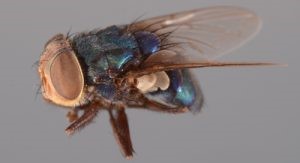Resumen
In October of 2016, the United States Department of Agriculture confirmed that the primary screwworm, also called the New World screwworm, has returned to Florida. The fly was found infesting Key deer on Big Pine Key. Key deer are an endangered species found only on the Florida Keys, and unfortunately several have died from the 2016 screwworm infestations, but the screwworm is not only a problem for deer and other wildlife. The pest poses a serious threat to all warm-blooded animals, including livestock, pets, and people, and it cost the US livestock industry billions of dollars before it was finally eradicated decades ago. This 5-page fact sheet provides more information about this dangerous pest and how to spot it, as well as what to do and whom to contact if you suspect an infestation in your livestock, pets, or in a wild animal. Written by Phillip E. Kaufman, Samantha M. Wisely, and Jennifer L. Gillett-Kaufman, and published by the Entomology and Nematology Department, October 2016.
If you suspect an infestation of screwworms in an animal, do not move the animal (to prevent spreading the infestation). Call 1-800-HELP-FLA (1-800-435-7352) inside Florida. Non-Florida residents should call (850) 4120-3800.
Citas
Broce AB, Goodenough JL, Coppedge JR. 1977. A wind oriented trap for screwworm flies. Journal of Economic Entomology 70: 413-416. https://doi.org/10.1093/jee/70.4.413
Byrd JH. 1998. Secondary screwworm, Cochliomyia macellaria (Fabricius). UF/IFAS Featured Creatures Document ENY-22. Revised August 2014. (04 October 2016)
Dyck VA, Hendrichs J, Robinson AS. 2005. Sterile Insect Technique: Principles and Practice in Area-wide Integrated Pest Management. Springer, Dordrecht, the Netherlands. 787 pp. https://doi.org/10.1007/1-4020-4051-2
Florida Department of Agriculture and Consumer Services. 2016. USDA confirms New World screwworm cases in Big Pine Key. FDACS Press Release. (11 April 2022)
Hall DG. 1948. The blow flies of North America, Thomas Say Foundation Publication vol. 4. Entomological Society of America, Lanham, MD. Publishers.
Hall MJR. 1991. Screwworm flies as agents of wound myiasis. World Animal Review: Special issue: New World screwworm response to an emergency. Oct: 08-17.
James MT. 1947. The flies that cause myiasis in man. United States Department of Agriculture Miscellaneous Publication No. 631. 175 pp. https://doi.org/10.5962/bhl.title.65688
Krafsur ES, Whitten CJ, Novy JE. 1987. Screwworm eradication in North and Central America. Parasitology Today 3(5): 131-137. https://doi.org/10.1016/0169-4758(87)90196-7
Laake EW, Cushing EC, Parish HE. 1936. Biology, of the primary screwworm fly, Cochliomyia americana, and a comparison of its stages with those of C. macellaria. USDA Tech. Bull. No. 500. Washington, D.C., USDA.
McAlpine JF. 1987. Manual of Nearctic Diptera, Volume 2. Canada Communication Group, Ottawa, Canada. 1332 pp.
Mullen GR, Durden LA. 2009. Medical and Veterinary Entomology (2nd ed.). Elsevier, London, UK. 637 pp.
Novy JE. 1991. Screwworm control and eradication in the southern United States of America. World Animal Review: Special issue: New World screwworm response to an emergency. Oct: 18-27.
Taboada O. 1966. Medical Entomology. Naval Medical School 1967. U.S. Government Printing Office, Washington D.C. 395 pp.
Vreysen MJB, Robinson AS, Hendrichs J. 2007. Area-wide Control of Insect Pests: From Research to Field Implementation. Springer, Dordrecht, the Netherlands. 789 pp. https://doi.org/10.1007/978-1-4020-6059-5
Welch JB. (2016). Cochliomyia hominivorax (New World screwworm) datasheet. CABI Invasive Species Compendium. (04 October 2016)
Williams RE, Hall RD, Broce AB, Scholl PJ (Eds.). 1985. Livestock Entomology. Wiley, New York, USA. 335 pp.

